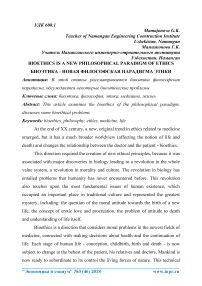Bioethics is a new philosophical paradigm of ethics
Автор: Mamajonova G.K.
Журнал: Экономика и социум @ekonomika-socium
Статья в выпуске: 3 (46), 2018 года.
Бесплатный доступ
This article examines the bioethics of the philosophical paradigm, discusses some bioethical problems
Bioethics, philosophy, ethics, medicine, life
Короткий адрес: https://sciup.org/140236314
IDR: 140236314
Текст научной статьи Bioethics is a new philosophical paradigm of ethics
At the end of XX century. a new, original trend in ethics related to medicine emerged, but it has a much broader worldview (affecting the notion of life and death) and changes the relationship between the doctor and the patient - bioethics.
This direction required the creation of new ethical principles, because it was associated with major discoveries in biology leading to a revolution in the whole value system, a revolution in morality and culture. The revolution in biology has entailed problems that humanity has never encountered before. This revolution also touches upon the most fundamental issues of human existence, which occupied an important place in traditional culture and represented the greatest mystery, including: the question of the moral attitude towards the birth of a new life, the concept of erotic love and procreation, the problem of attitude to death and understanding of life itself,
Bioethics is a direction that considers moral problems in the newest fields of medicine, connected with making decisions about health and the continuation of life. Each stage of human life - conception, childbirth, birth and death - is now subject to change at the behest of the patient, his relatives and doctors. Mankind is now ready to subordinate to its control the living forces of nature. This technical progress goes beyond traditional moral values. Therefore, a trend emerged, such as bioethics, whose task is to determine the limits of the use of new tools of life and death.
The main directions of research on the biological nature of man: modification of behavior with the help of «shock therapy», genetic engineering, surrogate motherhood, cloning, abortion ethics, organ transplantation, sale of children, sex change, artificial prolongation of life, euthanasia.
Considering the ethical responsibility of doctors, politicians, lawyers, philosophers and scientists for making such important decisions as the quality of genetic heredity of people, it is also necessary to discuss the problem of abortion (abortion).
This problem occupies a central place in bioethics, since it is connected with a whole host of other important issues. Is it possible to manipulate the fetus and what are the limits of these manipulations? Is it necessary to give birth to a child if it is known that it will be doomed to endless suffering, an incurable disease, or if this child is the result of violence? Should a woman give birth to a sick and weak child, if she can give birth to another, healthy? Is it possible to use an embryo in scientific research? Should embryos be discarded and what are the criteria?
If we are positive about the idea of genetic improvement of the human race, we must resolve the abortion, and vice versa.
The solution of the problem of abortion directly depends on the solution of a whole complex of other important problems of bioethics, therefore the problem of abortion is central to bioethics.
A special direction in bioethics is related to the practice of organ transplantation. As you know, the first heart and liver transplant was performed in 1967 in South Africa and the United States. Technical capabilities allow today to carry out this operation (as well as kidney, bone marrow, brain tissue) in many countries, but at the same time complex ethical problems arise. The first problem:
where to find the necessary number of donors? After all, the donor must be healthy and dead.
The second problem: to whom to give preference when choosing a recipient is more difficult for the patient, or for the one who is more waiting, or for the younger one? This is a matter of priority - who has the pre-emptive right to transplant - who is more dangerous than sick or who has more chances to live longer? Is it fair to give the liver to an alcoholic if normal people wait for it? Another ethical problem is the threat of a person becoming a biomass, an object of commercial interest. In addition, there is a danger that healthy people (but the poor) can become victims of the sick (but rich). There is a paradoxical situation when rich and sick people need the poor and healthy in order to buy their organs.
Bioethics issues today require more attention than ever. deep study of bioethics issues answers to many questions in human life, nationality and life, nature and human relationships.
Used source:
1. Лопатин П.В. Биоэтика. - М.: ГЭОТАР-Медиа, 2011. 2. Хрусталев Ю.М. Введение в биомедицинскую этику. - М.: Академия, 2010. 3. Mamajonova G.K. BIOETHICS IS APPLIED ETHICS //Теория и практика современной науки. – 2018. – №. 1. – С. 29-31
"Экономика и социум" №3 (46) 2018
Список литературы Bioethics is a new philosophical paradigm of ethics
- Лопатин П.В. Биоэтика. -М.: ГЭОТАР-Медиа, 2011.
- Хрусталев Ю.М. Введение в биомедицинскую этику. -М.: Академия, 2010.
- Mamajonova G.K. BIOETHICS IS APPLIED ETHICS//Теория и практика современной науки. -2018. -№. 1. -С. 29-31


